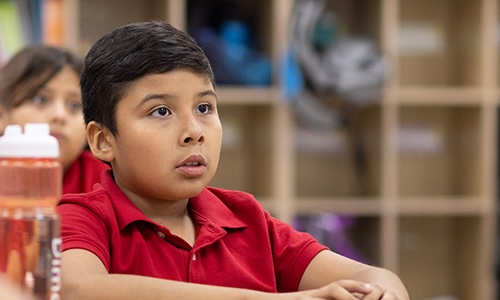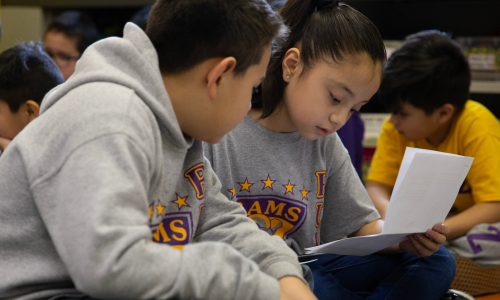
True or false? Your teacher development program adequately covered assessment literacy. This question was posed by Jacob Bruno, executive vice president of Learning and Improvement Services at NWEA, on a recent episode of The Continuing Educator podcast, where he met with Moon McCarley, principal and district testing coordinator on the Alaskan Peninsula, and Ashley Cruz, NWEA state professional learning consultant, currently based in Texas. These two educators in completely different parts of North America both gave their synchronous answer: “False!”
Assessment literacy includes everything from classroom skills, like preparing students for test day and facilitating goal-setting conversations with students, to more data-science skill sets, like interpreting test results and understanding areas of need. Regardless of what assessment is administered within a district, assessment literacy is a necessary component of teacher preparation and ongoing professional development—yet this takes time, and as Ashley says in the episode, “Teachers’ time is never on their side.”
Broadening teacher reach, from Texas to Alaska
Both Moon and Ashley knew early that they wanted to be teachers. Neither, however, could have pictured just how varied their path in education would be.
Moon began as a classroom teacher. She was quickly recognized as a leader and recruited to be an instructional coach. That led to the administrative side of things, and what began as a short stint in Alaska led to a full-time life there.
Ashley, recent president of the Texas Council for Teachers of Mathematics, was a math teacher who quickly saw the need for strong math curriculum. She served as a curriculum writer, instructional coach, and district-level MAP® Growth™ trainer before joining the NWEA state professional learning team. “I’ve always wanted to make a bigger impact,” Ashley says.
The need for assessment literacy
Educators of all areas—classroom teachers, curriculum writers, instructional coaches, administrators, and those working on broader policy and advocacy—know that assessment is a vital part of the educational landscape, especially at the macro level of district and state solutions. But how do we secure teacher buy-in and offer educators support as they decipher assessment data and determine what’s next?
Assessments like MAP Growth offer high-level, detailed data on the progress of student growth over time. Moon and Ashley speak realistically, pointing out that any assessment is often state mandated and takes away, however briefly, from instructional time. Because of this shared reality, all educators deserve literacy to turn an assessment’s results into actionable instructional shifts. Moon says, “Being able to build teacher understanding of why we’re assessing and how to use the data—from educators to students to parents—makes that time spent feel so much more worthwhile.”
Ashley and Moon share a passion for meeting what they identify as a pervasive need for assessment literacy across the country. Both encountered a lack of training in their teacher prep programs as well as ongoing difficulties with quality professional development. Ashley shared that throughout her travels, “We saw continually that this element of developing the data, understanding the assessment, understanding of pre-service educators is left wanting almost universally.”
The NWEA certified facilitator program
NWEA has partnered with the Alaska Department of Education and Early Development (DEED) to offer ongoing, on-demand assessment literacy training to “broaden educators’ individual and collective understanding of the purpose and use of a range of assessment measures.” This is the kind of teacher professional development lacking in prep programs: hands-on, just-in-time learning with real data and decision-making stakes. Ashley puts it simply: these trainings are to get educators on the same page with the question, “Are we effectively gathering evidence of student learning to inform decisions?”
Moon went through the certified facilitator program to increase her impact by bringing assessment literacy strategies to districts across Alaska. These “train the trainer” in-person and virtual workshops help educators:
- Efficiently administer assessment tools and data
- Effectively apply strategies for data-informed decision-making
- Seamlessly implement formative instructional practices using data to inform instruction.
Moon highlights the strengths of a collaborative program that meets the unique needs of the state and allows school leaders a time to connect with like-minded—and similarly challenged—educators. Of course, Alaska faces unique circumstances that the lower 48 often overlook. Moon speaks of scattered, far-flung sister districts, saying, “You can only reach them by plane, so it’s very isolating. Yet you don’t feel isolated in these when we all are able to get together and work together.”
In addition to essential collaborative time, Ashley and Moon spotlight the value added by the certified facilitator program and its potential to increase assessment effectiveness. In response to Jacob’s question, “Why would you recommend this program to others?” both Moon and Ashley focused on three big takeaways:
- The program bolsters teacher personal growth and professional development. Teachers finally receive that ongoing, focused professional development with real stakes and real scores that allow them to safely ask assessment literacy questions, building confidence that they take back to their schools. As Moon says, “My personal growth and deepened understanding is really valuable to me and has enriched the educators I work with, giving them more tools and more confidence in turn.”
- Facilitators grow their learning exponentially due to shared experiences. Hearing others’ stories, questions, and aha moments compounds the learning, allowing teachers to feel part of a larger mission. “When facilitators come to these learning events, we’re able to collaborate and build upon one another’s knowledge,” Ashley says.
- Educators leave with clear take-aways for student-facing shifts. We can all agree that educator buy-in, understanding, and mindset toward assessment matters. “If I don’t understand the incentive, purpose, and intent for an assessment, then students are likely not going to either,” Ashley admits.
Hear more on The Continuing Educator
Ready to listen to the whole conversation? Listen to the podcast episode and hear how assessment literacy training helps aid the mission of NWEA: helping all students learn.
Want to learn more about how NWEA can bolster assessment literacy in your state or district? Contact our State Solutions team. And for a quick guide on assessment literacy for your position, check out “How to be assessment literate, no matter your role.”







